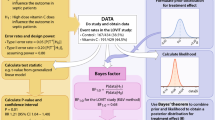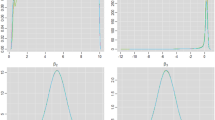Abstract
Bayes’ rule shows how one might rationally change one’s beliefs in the light of evidence. It is the foundation of a statistical method called Bayesianism. In health care research, Bayesianism has its advocates but the dominant statistical method is frequentism. There are at least two important philosophical differences between these methods. First, Bayesianism takes a subjectivist view of probability (i.e. that probability scores are statements of subjective belief, not objective fact) whilst frequentism takes an objectivist view. Second, Bayesianism is explicitly inductive (i.e. it shows how we may induce views about the world based on partial data from it) whereas frequentism is at least compatible with non-inductive views of scientific method, particularly the critical realism of Popper. Popper and others detail significant problems with induction. Frequentism’s apparent ability to avoid these, plus its ability to give a seemingly more scientific and objective take on probability, lies behind its philosophical appeal to health care researchers. However, there are also significant problems with frequentism, particularly its inability to assign probability scores to single events. Popper thus proposed an alternative objectivist view of probability, called propensity theory, which he allies to a theory of corroboration; but this too has significant problems, in particular, it may not successfully avoid induction. If this is so then Bayesianism might be philosophically the strongest of the statistical approaches. The article sets out a number of its philosophical and methodological attractions. Finally, it outlines a way in which critical realism and Bayesianism might work together.
Similar content being viewed by others
References
J. Bland D. Altman (1998) ArticleTitle‘Bayesians and Frequentists’ British Medical Journal 317 1151 Occurrence Handle9784463
A. Chalmers (1999) What Is This Thing Called Science? EditionNumber3 Open University Press Buckingham
D. Cox (2001) ArticleTitle‘Another Comment on the Role of Statistical Methods’ British Medical Journal 322 230–231
F. Davidoff (1999) ArticleTitle‘Standing Statistics Right Side Up: Editorial’ Ann Internal Medicine 130 1019–1021
J. Earman (1992) Bayes or Bust? A Critical Examination of Bayesian Confirmation Theory MIT Press Cambridge MS
D. Gillies (2000) ArticleTitle‘Varieties of Propensity’ British Journal for the Philosophy of Science 51 807–835 Occurrence Handle10.1093/bjps/51.4.807
J. Good (1975) ArticleTitle‘Explicativity, Corroboration, and the Relative Odds of Hypotheses’ Synthese 30 39–73 Occurrence Handle10.1007/BF00485294
S. Goodman (1999a) ArticleTitle‘Towards Evidence Based Medical Statistics 1: The P-value Fallacy’, Ann Internal Medicine 130 995–1004
S. Goodman (1999b) ArticleTitle‘Towards Evidence Based Medical Statistics 2: The Bayes Factor’ Ann Internal Medicine 130 1005–1013
L. Gurrin J. Kurinczuk P. Burton (2000) ArticleTitle‘Bayesian Statistics in Medical Research: An Intuitive Alternative to Conventional Data Analysis’ Journal of Evaluation in Clinical Practice 6 193–204 Occurrence Handle10.1046/j.1365-2753.2000.00216.x Occurrence Handle10970013
I. Hacking (2001) An Introduction to Probability and Inductive Logic Cambridge University Press Cambridge
C. Howson (1995) ArticleTitle‘Theories of Probability’ British Journal for the Philosophy of Science 46 1–32
R. Jeffrey (1975) ArticleTitle‘Probability and Falsification: Critique of the Popper Programme’ Synthese 30 95–117 Occurrence Handle10.1007/BF00485298
R. Lilford D. Braunholtz (1995) ArticleTitle‘Clinical Trials and Rare Diseases: A Way Out of the Conundrum’ British Medical Journal 311 1621–1625 Occurrence Handle8555809
R. Lilford D. Braunholtz (1996) ArticleTitle‘The Statistical Basis of Public Policy: A Paradigm Shift is Overdue’ British Medical Journal 313 603–607 Occurrence Handle8806254
R. Lilford D. Braunholtz (2003) ArticleTitle‘Reconciling the Quantitative and Qualitative Traditions–The Bayesian Approach’ Public Money & Management 23 203–207
K. Linde N. Clausius G. Ramirez (1997) ArticleTitle‘Are the Clinical Effects of Homeopathy Placebo Effects? A Meta-Analysis of Placebo Controlled Trials’ Lancet 350 834–843 Occurrence Handle10.1016/S0140-6736(97)02293-9 Occurrence Handle9310601
O’Hagan, A. and B. Luce: 2003, A Primer on Bayesian Statistics in Health Economics and Outcomes Research, Chebs/MEDTAP URL: http://www.shef.ac.uk/chebs/ [accessed 5.9.03].
A. O’Hear (1980) Karl Popper RKP London
A. O’Hear (Eds) (1995) Karl Popper: Philosophy and Problems Cambridge University Press Cambridge
S. Okasha (2001) ArticleTitle‘What Did Hume Really Show About Induction?’ Philosophical Quarterly 51 IssueID204 307–327 Occurrence Handle10.1111/1467-9213.00231
D. Papineau (1995) ‘Methodology: The Elements of the Philosophy of Science’ A Grayling (Eds) Philosophy OUP Oxford 123–180
K. Popper (1983) Realism and the Aim of Science Hutchinson London
K. Popper (1989) Conjectures and Refutations EditionNumber5 Routledge London
K. Popper (1992) The Logic of Scientific Discovery Routledge London
K. Roberts M. Dixon-Woods R. Fitzpatrick K. Abrams D. Jones (2002) ArticleTitle‘Factors Affecting Uptake of Childhood Immunisation: A Bayesian Synthesis of Qualitative and Quantitative Evidence’ Lancet 360 1596–1599 Occurrence Handle10.1016/S0140-6736(02)11560-1 Occurrence Handle12443615
R. Rosenkrantz (1994) ArticleTitle‘Bayesian Confirmation: Paradise Regained’ British Journal for the Philosophy of Science 45 467–476
D. Ruben (1998) ‘The Philosophy of the Social Sciences’ A Grayling (Eds) Philosophy 2 OUP Oxford 420–469
L. Sklar (2000) ‘Introduction’ L. Sklar (Eds) Bayesian and Non-inductive Methods Garland New York vii–x
B. Skyrms (2000) ‘Bayesian Projectability’ L Sklar (Eds) Bayesian and Non-inductive Methods Garland New York 1–22
D Spiegelhalter J Myles D Jones K Abrams (2000) ArticleTitleBayesian Methods in Health Technology Assessment: A Review Health Technology Assessment 4 IssueID38 ␣–␣
J. Sterne G. Davey-Smith (2001) ArticleTitle‘Sifting the Evidence–What’s Wrong with Significance Tests?’ British Medical Journal 322 266–231 Occurrence Handle11157526
J. Vandenbroucke (1998) ArticleTitle‘Clinical Investigation in the 20th Century: The Ascendancy of Numerical Reasoning’ Lancet 352 IssueID(SII) 12–16 Occurrence Handle10.1016/S0140-6736(98)90293-8
R. Winkler (2001) ArticleTitle‘Why Bayesian Analysis Hasn’t Caught on in Healthcare Decision Making’ International Journal of Technology Assessment in Health Care 17 IssueID1 56–66 Occurrence Handle10.1017/S026646230110406X Occurrence Handle11329845
J. Worral (1998) ‘Philosophy and the Natural Sciences’ A Grayling (Eds) Philosophy 2 OUP Oxford 197–266
H. Wulff P. Gøtzche (2000) Rational Diagnosis and Treatment, 3rd edn Blackwell Science Oxford
Author information
Authors and Affiliations
Corresponding author
Rights and permissions
About this article
Cite this article
Allmark, P. Bayes and health care research. Med Health Care Philos 7, 321–332 (2005). https://doi.org/10.1007/s11019-004-0804-4
Issue Date:
DOI: https://doi.org/10.1007/s11019-004-0804-4




